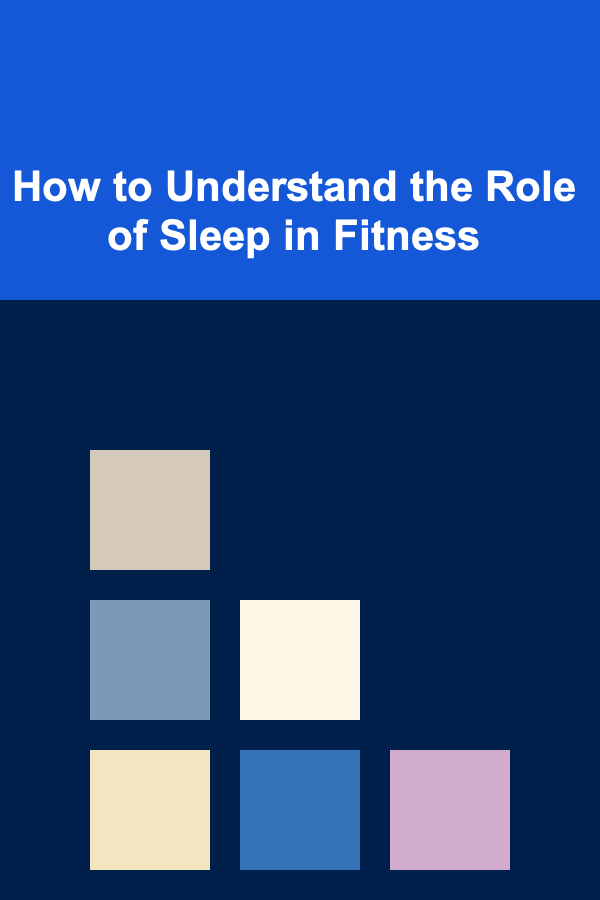
How to Understand the Role of Sleep in Fitness
ebook include PDF & Audio bundle (Micro Guide)
$12.99$11.99
Limited Time Offer! Order within the next:

Fitness is often perceived as a result of consistent workouts, healthy eating, and motivation. However, one of the most critical yet overlooked components in achieving peak fitness is sleep. Many people focus on the gym routine, the sets, reps, or meal plans but fail to realize the immense impact that sleep has on muscle recovery, energy levels, mental clarity, and overall performance.
This article explores the relationship between sleep and fitness, diving into the physiological and psychological roles sleep plays in fitness, the consequences of sleep deprivation, and practical tips on how to optimize sleep for improved fitness outcomes.
The Science of Sleep
Before delving into its effects on fitness, it's essential to understand the biological processes that occur during sleep. Sleep is not just a passive state of rest, but a complex process where the body and brain undergo critical repair and maintenance tasks. On average, an adult requires 7-9 hours of sleep per night to function optimally, but the quality of sleep matters just as much as the quantity.
Sleep Stages
Sleep occurs in two primary phases:
-
Non-REM Sleep (NREM):
- Stage 1 (Light Sleep): The transition between wakefulness and sleep. Your muscles begin to relax, and your heart rate slows down.
- Stage 2 (Deeper Sleep): The body temperature drops, heart rate stabilizes, and brain activity slows.
- Stage 3 (Slow-Wave Sleep or Deep Sleep): This is the most restorative phase of sleep, where the body is in full recovery mode. Muscle repair and growth occur, and the immune system is strengthened.
-
REM Sleep:
- REM (Rapid Eye Movement) sleep is where vivid dreaming occurs. This stage is crucial for cognitive functions like memory consolidation, learning, and emotional regulation.
The cycle alternates between NREM and REM sleep several times throughout the night, with deep sleep being more prominent during the first few hours and REM sleep dominating the latter half of the night.
Sleep and Hormone Regulation
Sleep significantly affects various hormones in the body, many of which are involved in fitness and recovery. Some key hormones regulated by sleep include:
- Growth Hormone (GH): Released during deep sleep, growth hormone is essential for tissue repair and muscle growth. This is the reason why sleep is often called the body's "natural recovery mechanism."
- Cortisol: Known as the stress hormone, cortisol rises during periods of sleep deprivation, which can impair recovery and negatively affect muscle development.
- Testosterone: Testosterone levels are also regulated during sleep, and a lack of sleep can reduce its production, affecting muscle building and fat metabolism.
The Role of Sleep in Physical Recovery
One of the primary reasons why sleep is crucial for fitness is its role in physical recovery. After intense physical activity, muscles undergo micro-tears that need time to repair. This process occurs primarily during sleep.
Muscle Repair and Growth
When you work out, you create tiny tears in your muscle fibers, which is a normal and necessary part of muscle growth. Your body repairs these tears during sleep by fusing the muscle fibers and creating new muscle tissue, a process known as muscle protein synthesis . The release of growth hormone during deep sleep plays a major role in this repair process.
Without adequate sleep, muscle protein synthesis is impaired, and recovery from exercise is delayed. This means that over time, inadequate sleep can result in slower progress in strength, endurance, and overall fitness. This is why elite athletes prioritize sleep as much as their training sessions.
Immune System Function
Sleep also plays a critical role in immune function, which directly affects your ability to recover from workouts. During sleep, the immune system produces cytokines, proteins that help fight infection and inflammation. Sleep deprivation can lead to a weakened immune system, increasing the risk of illness and impairing your ability to recover from physical stress.
Furthermore, chronic sleep deprivation can result in prolonged inflammation in the body, which can hinder the healing of muscles and tissues after intense exercise.
Sleep and Energy Levels
Another significant aspect of sleep's role in fitness is its effect on energy levels. During sleep, the body undergoes metabolic processes that restore energy stores and prepare the body for the next day's physical activity.
ATP Resynthesis
Adenosine triphosphate (ATP) is the primary source of energy used by muscles during exercise. Sleep is crucial for replenishing ATP levels. After an intense workout, the body needs to regenerate ATP to ensure that muscles have the necessary fuel for the next workout session. Sleep ensures the resynthesis of ATP, which in turn supports overall performance and endurance.
Cognitive Function and Focus
Physical fitness isn't just about strength and endurance; mental focus plays an equally important role. Sleep is critical for cognitive functions such as decision-making, concentration, and focus. If you don't get enough sleep, you might feel fatigued, have difficulty concentrating, or even struggle with coordination, which can increase the risk of injury during exercise.
The Impact of Sleep Deprivation on Fitness
Sleep deprivation has a cascade effect on physical performance, muscle growth, mental sharpness, and overall well-being. It can interfere with the balance of hormones, impair recovery, reduce exercise performance, and even lead to serious long-term consequences like chronic fatigue or overtraining syndrome.
Impaired Recovery
Without sufficient sleep, your muscles don't have enough time to repair themselves properly. This can result in slower recovery times, increased soreness, and a higher risk of injury. If you continuously train without proper sleep, you may experience a condition called overtraining syndrome, where your performance plateaus or declines due to inadequate recovery.
Decreased Performance
Sleep deprivation significantly reduces athletic performance. Studies have shown that even one night of poor sleep can lead to a decrease in strength, endurance, and reaction times. Over time, chronic lack of sleep can lead to long-term decreases in performance and overall fitness levels.
Mood and Motivation
Sleep deprivation negatively affects mood, leading to irritability, anxiety, and depression. When you don't sleep enough, you are more likely to skip workouts, have low motivation, and struggle with mental burnout. This creates a cycle where poor sleep leads to decreased fitness, which in turn makes it harder to get quality sleep.
Increased Risk of Injury
Lack of sleep reduces your ability to focus, coordinate, and react quickly. This increases the likelihood of accidents, muscle strains, joint injuries, and other fitness-related injuries. Restorative sleep is essential for maintaining motor skills and avoiding injuries, especially when engaging in high-intensity workouts.
How Much Sleep Do You Need for Fitness?
The optimal amount of sleep varies from person to person, but most adults need 7-9 hours of sleep per night for optimal physical and mental performance. However, athletes or individuals engaging in intense training may require more sleep to support recovery and muscle growth.
Signs of Insufficient Sleep
If you're not getting enough sleep, your body will give you signals. These may include:
- Fatigue or feeling lethargic during workouts.
- Decreased strength and performance during exercise.
- Frequent illness or a weakened immune system.
- Difficulty concentrating or lack of focus during workouts.
- Mood swings or irritability.
Sleep Optimization Tips for Fitness Enthusiasts
Here are a few practical tips to help optimize your sleep for better fitness results:
- Establish a Sleep Routine: Try to go to bed and wake up at the same time every day, even on weekends. This helps regulate your body's internal clock.
- Create a Relaxing Sleep Environment: Keep your bedroom dark, quiet, and cool to promote restful sleep. Consider using blackout curtains and white noise machines if needed.
- Limit Screen Time Before Bed: Avoid exposure to blue light from screens (phones, tablets, computers) at least an hour before bed, as it can interfere with melatonin production and disrupt sleep.
- Watch Your Caffeine Intake: Avoid consuming caffeine in the afternoon or evening, as it can interfere with your ability to fall asleep.
- Use Active Recovery: On rest days, engage in light activities like yoga, stretching, or walking to promote circulation and reduce muscle soreness without overtaxing your body.
- Eat Well: A balanced diet with proper hydration supports sleep. Avoid heavy meals close to bedtime, as they can disrupt sleep.
- Listen to Your Body: If you're feeling overly fatigued or sore, don't hesitate to take an extra rest day or get more sleep to aid recovery.
Conclusion
The role of sleep in fitness cannot be overstated. Sleep is a vital component of recovery, energy regulation, muscle growth, and performance. Adequate and restorative sleep enhances the benefits of your physical training, boosts mental clarity, and reduces the risk of injuries. Whether you're an elite athlete or a fitness enthusiast, understanding the importance of sleep and prioritizing it in your routine is essential for long-term fitness success.
By improving the quality and quantity of your sleep, you can optimize your workouts, enhance recovery, and ultimately reach your fitness goals more effectively and sustainably.

How to Communicate with Your Certified Pet Sitter Effectively
Read More
How to Educate Your Community About the Importance of Beekeeping
Read More
How to Start Investing with Little Money and Grow Your Wealth
Read More
Why You Should Involve the Whole Family in Organization Projects
Read More
How To Master the Neuroscience of Emotional Intelligence
Read More
Developing Hyperloop Transportation Systems: A Deep Dive
Read MoreOther Products

How to Communicate with Your Certified Pet Sitter Effectively
Read More
How to Educate Your Community About the Importance of Beekeeping
Read More
How to Start Investing with Little Money and Grow Your Wealth
Read More
Why You Should Involve the Whole Family in Organization Projects
Read More
How To Master the Neuroscience of Emotional Intelligence
Read More